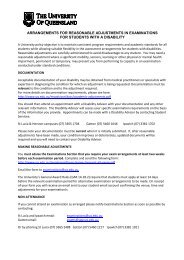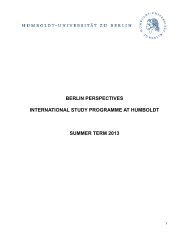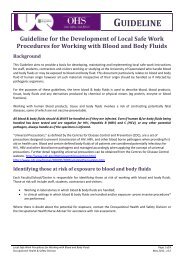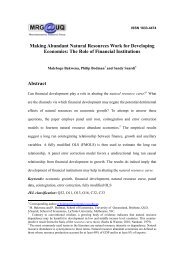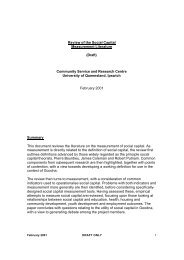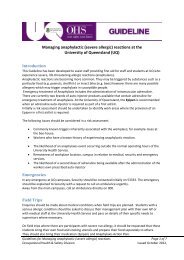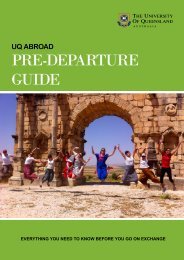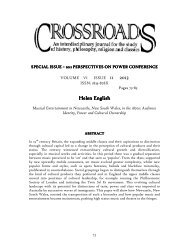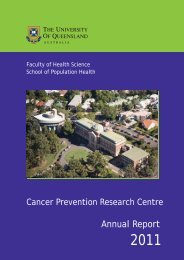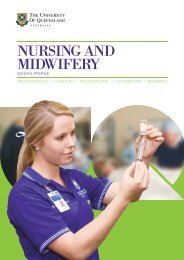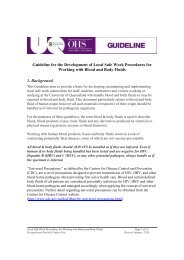Winter 2013 - University of Queensland
Winter 2013 - University of Queensland
Winter 2013 - University of Queensland
You also want an ePaper? Increase the reach of your titles
YUMPU automatically turns print PDFs into web optimized ePapers that Google loves.
LookiNG fOR acAREER chANGE?Become a Primary Teacher in 1½ yearsUQ’s new Master <strong>of</strong> Teaching (Primary) program will prepareyou for the classroom in 1½ years <strong>of</strong> full-time study.As the first <strong>of</strong> its kind in <strong>Queensland</strong> to meet newnational teaching standards, you’ll be leading the way inimplementing the new national teaching curriculum.CRICOS Provider Number 00025BWith carefully designed courses, taught by national andinternational award-winning lecturers, you’ll be thoroughlyprepared for a career in the education sector.More information:T: (07) 3365 6550 E: info.education@uq.edu.auuq.edu.au/education/teach-primaryYOUR UQ. YOUR ADVANTAGE.uq.edu.authose interests forward. This is one reasonwhy models that suggest leaders needto have a particular set <strong>of</strong> predeterminedcharacteristics <strong>of</strong>ten fall short. Leaders needto contribute to a group identity and actionthat allow “us” to be construed as differentfrom, and better than, “them”.For example, while people may generallybe disposed to favour leaders who areintelligent, if an organisation is competing witha group that prides itself on its intelligence,the leader has to be careful to differentiatethe organisation’s intelligence from that <strong>of</strong> theother group. To win the 2004 US election,George W. Bush didn’t need to show thathe was smarter than his rival, John Kerry,which is probably just as well. What he didneed to do was show that he was more intouch with the American people and moreconcerned about their interests. It would havebeen foolish for him to project the image <strong>of</strong>a Harvard-educated scion <strong>of</strong> a fabulouslyprivileged family, just as it was a colossalmistake for Mitt Romney to be overheardinfamously disparaging 47 per cent <strong>of</strong>Americans – many <strong>of</strong> whom he needed votesfrom in order to get elected.So, if you want to lead a group, don’t trashit. If you do, you won’t have a group to lead.Leaders need to“make us work”You might imagine from the previous pointsthat leadership is all about rhetoric andimage: about saying the right things andbeing seen in the right place. These thingscertainly help, but on their own they’re notenough. Good leaders have to work veryhard. In particular, they have to work hard tocreate the structures and initiate the activitiesthat allow the group to succeed.40-odd years <strong>of</strong> research shows thateffective leaders work to transform groups inways that allow their potential to be realised.An obvious way <strong>of</strong> doing this is throughrestructuring. Indeed, awareness <strong>of</strong> thisfact has meant that in the contemporaryorganisational world, most would-beorganisational leaders embrace restructuringwith something close to religious zeal. Yetstudies show that around 80 per cent <strong>of</strong>restructures fail. Rather than help followers,they leave them demoralised, dispirited andbroken.Why do so many restructures fail? Oneanswer – which the research <strong>of</strong> another<strong>of</strong> my UQ colleagues, Pr<strong>of</strong>essor JolandaJetten, has found – is that leaders routinelyforget that for change to be effective, theyneed to work with their followers’ identities,not against them. If someone has spent alifetime working for Unit X, it’s a fair bet thatUnit X has become an important part <strong>of</strong> whothey are and how they see the world. If theyturn up to work one day and find that UnitX is now Unit Y, they’re going to experienceidentity threat, and probably identity crisis.But why should you care? Well, for thesimple reason that such identities are almostcertainly a basis for much <strong>of</strong> a person’swork-based motivation. Our research alsoshows that they are a basis for goodcommunication, effective support andtrust. In short, identity is the stuff <strong>of</strong> theirfollowership, and hence your leadership.The three R’s<strong>of</strong> leadershipThese three points boil down to what weterm the three R’s <strong>of</strong> leadership: the needto reflect upon the nature <strong>of</strong> the group youwant to lead, the need to represent thatgroup, and the need to devise structuresand activities that help group membersrealise their collective potential. While much<strong>of</strong> leadership literature is written in the firstpersonsingular (it’s “all about me”), it shouldin fact be written in the first-person plural.Leadership is “all about us”.If you find this a bit far-fetched, let meleave you with this tantalising fact recentlybrought to light by the (yet to be published)research <strong>of</strong> my colleague Nik Steffens. Since1901, there have been 43 Australian federalelections. In 40 <strong>of</strong> those elections, thecandidate who went on to win was the onewho used the words “we” and “us” most intheir <strong>of</strong>ficial campaign speech. Why is this?The answer, we suggest, is that these werethe leaders who not only understood mostclearly that they needed to represent theelectorate, but also who felt most keenlythat they were in a position to do so.In short, if you find it hard to say (andthink) “we”, you’re probably in the wrongplace to be a leader.UQ Contact WINTer <strong>2013</strong> 29


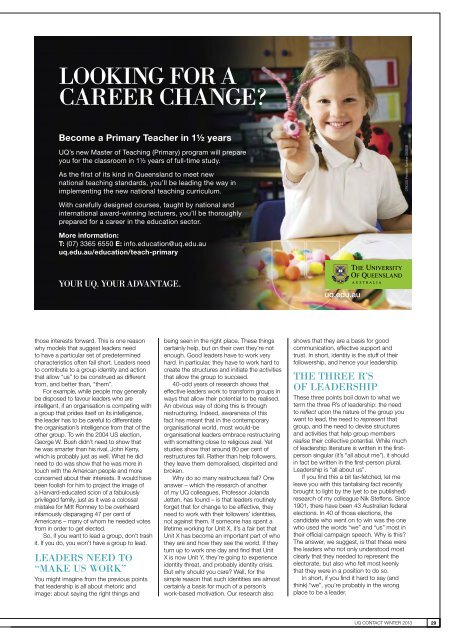
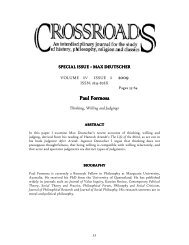
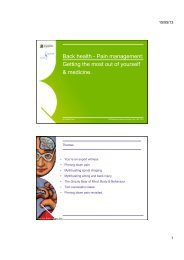
![Recycling [ PDF, 62KB ] - University of Queensland](https://img.yumpu.com/51805185/1/184x260/recycling-pdf-62kb-university-of-queensland.jpg?quality=85)
